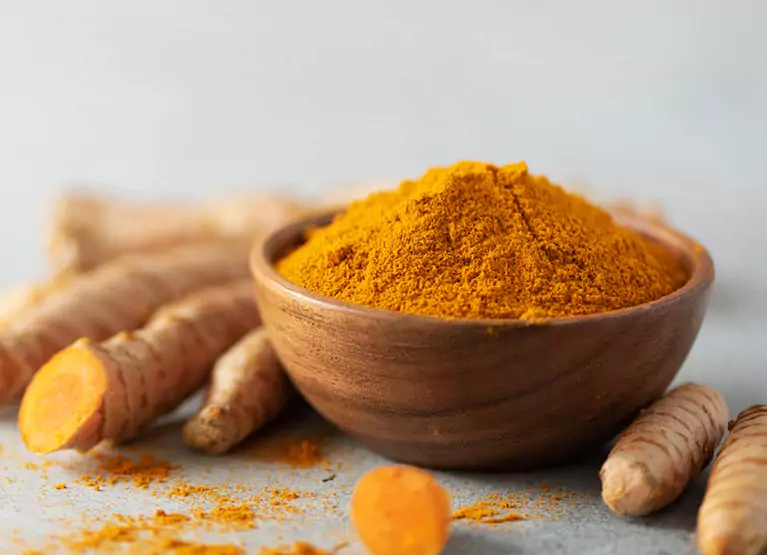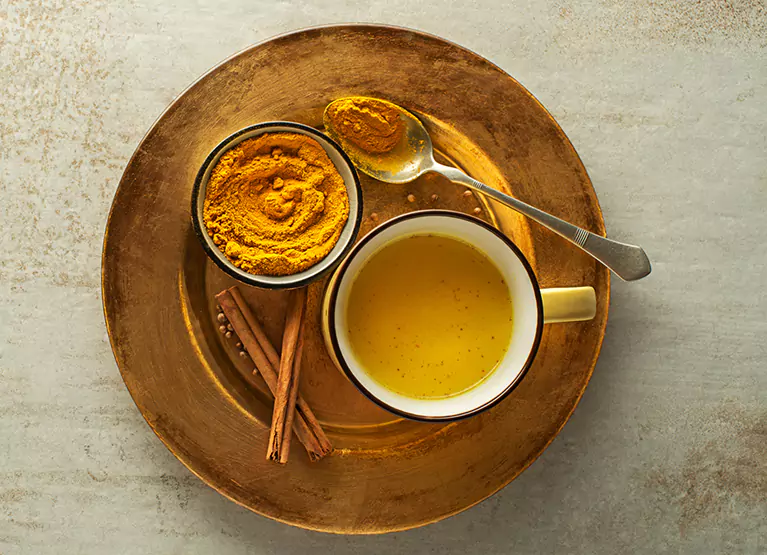Does Turmeric Help Lower Blood Sugar?

Key Takeaways
If you enjoy Indian curries, golden milk, or even mustard, chances are you have eaten turmeric. This tuberous, herbaceous plant has a peppery, bitter taste and is known for its vivid yellow color.
Turmeric has been used for thousands of years to improve health and treat inflammation, respiratory problems, blood circulation, and digestive issues. It is native to India and Indonesia, and is widely used in Indian, South Asian, African and Middle Eastern cuisine.
The medicinal properties of turmeric come from a chemical called curcumin, which is also what gives this plant its distinctive yellow color. But, is there evidence that turmeric actually helps with these health conditions?
Can turmeric have a positive effect on blood sugar? Read on to find out.
The Health Benefits of Turmeric
Like many other herbs and spices, turmeric has been used to treat various health conditions for centuries. These conditions include high cholesterol, cardiovascular issues, Alzheimer’s disease, fatty liver disease, kidney disease, and inflammation.
Let’s take a look at the evidence for these treatments.
Cholesterol and Cardiovascular Health

A 2017 review of existing studies found that subjects in clinical trials who were treated with turmeric and curcumin had lower LDL levels than those who were not. Turmeric did not appear to have a significant effect on HDL levels.
Another 2022 study found that turmeric may prevent cardiovascular disease by lowering the risk of factors such as oxidative stress, obesity, and inflammation. Despite these promising findings, more studies are needed to determine efficacy and correct dosages.
Blood Pressure
Uncontrolled high blood pressure, or hypertension, increases your risk of many serious health problems. These can include heart attack, stroke, aneurysm, heart failure, kidney problems, metabolic syndrome, and dementia.
A 2019 review of 11 studies found that turmeric may have a role in reducing blood pressure in patients who take it for over 12 weeks. However, more research is needed to confirm the results.
Alzheimer’s Disease
Curcumin has been shown to be an effective treatment for symptoms related to Alzheimer’s disease. Alzheimer’s is a neurological disorder that causes memory loss, changes in personality and behavior, and affects the ability to make decisions and perform familiar tasks.
Curcumin is also known to have anti-inflammatory properties. A 2008 overview of research reported that this chemical might be effective at reducing the chronic inflammation of nerve cells that occurs in individuals with Alzheimer’s disease.
Studies in mice cited in this review found that the levels of this plaque were reduced by 40 percent in mice given low doses of curcumin. This is promising research, though large-scale human studies are still needed in order to draw conclusions.
Fatty Liver Disease

Nonalcoholic fatty liver disease, or NAFLD, is characterized by a buildup of fat in the cells of the liver. Insulin resistance, obesity, high blood sugar, and high levels of fats in the blood are all linked to NAFLD.This condition can result in fluid buildup in the abdomen, swelling of the veins in your esophagus, confusion and drowsiness. In some cases, it can lead to liver cancer and end-stage liver failure.
A 2019 review of clinical trials found that the severity of NAFLD, and liver damage in general, may be lowered by curcumin. Because most of these trials had a small sample size, large-scale trials are needed to corroborate their findings.
Diabetic Nephropathy
Diabetic nephropathy, or diabetic kidney disease, is a complication of both type 1 and type 2 diabetes. It affects your kidney’s filtering system and can result in kidney failure, which can be life-threatening.
A 2017 study found that curcumin may have renoprotective effects on mice with diabetes. This suggests that it may protect the tubular cells of the kidneys and suppress inflammation.
Another 2021 meta-analysis of clinical trials found that curcumin supplements may improve renal function in people with diabetic kidney disease. Again however, large-scale human research is needed to prove these effects.
Inflammation

Curcumin is high in polyphenols, tannins, flavonoids and ascorbic acid. These are all antioxidants that can help prevent conditions like heart disease and diabetes.
Antioxidants fight free radicals in the body, which are molecules that damage cells and DNA. These antioxidants can help prevent cell damage, playing a key role in preventing chronic inflammation.
However, research has found that when consumed orally, only a small concentration of curcumin actually reaches the bloodstream and is absorbed. This indicates that the anti-inflammatory properties of curcumin may be limited.
Turmeric and High Blood Sugar Levels
There is evidence that turmeric may have a positive effect on blood sugar levels. A 2012 clinical trial found that curcumin decreased blood sugar by reducing serum free fatty acid levels in the blood.
A large amount of free fatty acids in your blood can increase your risk of cardiovascular disease, metabolic syndrome, obesity, and type 2 diabetes. The trial also found that curcumin increased fatty acid oxidation, the process of transforming fatty acids in the blood into metabolic energy.
In another 2012 clinical trial conducted in Thailand, 240 people with prediabetes were randomly assigned to receive either curcumin or placebo capsules. After 9 months, about 16 percent of the placebo group was diagnosed with type 2 diabetes, while none of the participants in the curcumin group were.
A review of research published in 2013 also found evidence that curcumin could mitigate or prevent type 2 diabetes, hyperglycemia, insulin resistance, and hyperlipidemia in animals.
While these studies are promising, there is a lot more work to be done to determine how turmeric can affect blood sugar. At this time. more large-scale research and human trials are needed.
Side Effects of Turmeric to Consider

While turmeric is generally considered safe to eat, it’s important to monitor your overall consumption of this spice. When taken as a supplement, turmeric has been associated with an increased risk of kidney stones in some individuals.
In Bangladesh, it was found that some sources of turmeric contained lead chromate, an additive that enhances its yellow color. Lead chromate is a huge risk to human health and development.
Lead has turned up in turmeric in the United States as well, and Consumer Reports has provided a list of turmeric supplement brands to avoid because they may contain this harmful substance.
Curcumin may also interact with some prescription drugs. If you are taking prescription medications, consult your doctor before taking a turmeric supplement.
Our Favorite Ways to Add Turmeric to Your Diet
If you’re looking to add more turmeric to your diet, here are five recipes we love. Remember to use caution when cooking with this spice, since it has a tendency to stain clothes and countertops.
1) Turmeric Tea from 101 Cookbooks
If you’re a tea lover, add some turmeric to your daily tea with this simple tea recipe. Don’t forget the black pepper, as the combination of curcumin and piperine is thought to increase the bioavailability of turmeric and make it easier to absorb.
Ingredients
- ⅓ cup raw honey
- 2 ½ teaspoons dried turmeric
- Lemon
- Freshly ground black pepper to taste
2) Golden Milk from The Spruce Eats

Golden milk, or turmeric milk, is a popular and nourishing drink originating in India. Try out this recipe to add more turmeric to your diet.
Ingredients
- 1 ½ cups milk or plant-based milk
- 1 1-inch piece fresh turmeric
- 1 1-inch piece fresh ginger
- ½ teaspoon pure vanilla extract
- 3-4 whole black peppercorns
- ¼ teaspoon ground cinnamon
- 1 pinch cardamom
- 1-2 teaspoons raw honey (optional)
3) Roasted Cauliflower in Turmeric from The Kitchn
This flavorful dish is full of flavor and bright in color. Cauliflower is also a great source of fiber, which can support healthy glucose levels.
Ingredients
- 2 pounds cauliflower, broken into bite-size florets
- 1 teaspoon garam masala, homemade or store-bought
- Fine sea salt
- 4 tablespoons grapeseed or other neutral oil
- 5 ½ ounces minced red onion
- ½ teaspoon ground turmeric
- ½ teaspoon red chile powder (optional)
- ¼ cup chickpea flour
- 2 cups fresh kefir or buttermilk
- ½ teaspoon cumin seeds
- ½ teaspoon black or brown mustard seeds
- 1 teaspoon red chili flakes
- 2 tablespoons chopped cilantro or flat-leaf parsley
4) Turmeric Curry with Chickpeas and Cauliflower from Purely Kaylie

This chickpea curry is filled with dietary fiber, beneficial herbs and spices, B vitamins, and plant-based protein. Try whipping this up for dinner and enjoy the delicious flavors.
Ingredients
- 1 tablespoon coconut oil
- 1 small yellow onion, diced
- 4 cloves garlic, minced
- 1 tablespoon grated or minced ginger
- 2–3 teaspoons curry powder
- 2 teaspoons ground turmeric
- 1 teaspoon ground cumin
- ½ teaspoon ground coriander
- 1 small head cauliflower, chopped into florets
- 1 can full-fat coconut milk
- 1½ cup vegetable broth
- 1 can garbanzo beans, drained and rinsed
- 2 teaspoons coconut sugar
- ½ teaspoon salt
- Brown or white rice, fresh cilantro, and almonds, for serving
5) Turmeric Scrambled Eggs from BBC Good Food
Start your day with antioxidants and protein with this simple breakfast dish. Replace the sourdough with whole grain bread for even more benefits. If you’re following a vegan diet, you can even swap out the eggs for tofu.
Ingredients
- 1 teaspoon coconut oil
- ½ garlic clove, finely chopped
- 100 grams spinach leaves
- 4 large eggs
- 50 milliliters coconut milk
- 2 teaspoons grated turmeric
- 2 slices sourdough bread, toasted
Find the right Nutrisense programto turn insight into progress.
Go Beyond Glucose Data with Nutrisense
Your glucose can significantly impact how your body feels and functions. That’s why stable levels are an important factor in supporting overall wellbeing. But viewing glucose isn't enough. Nutrisense, you’ll be able to learn how to use your body's data to make informed lifestyle choices that support healthy living.
One-to-one coaching
Sign up to access insurance-covered video calls to work with a glucose expert: a personal registered dietitian or certified nutritionist who will help tailor your lifestyle and diet to your goals.
Monitor and measure what matters
With the Nutrisense CGM Program, you can monitor your glucose with health tech like glucose biosensors and continuous glucose monitor (CGM)s, and analyze the trends over time with the Nutrisense App. This will help you make the most informed choices about the foods you consume and their impact on your health.
Find your best fit
Ready to take the first step? Start with our quiz to find the right Nutrisense program to help you take control.

Heather is a Registered and Licensed Dietitian Nutritionist (RDN, LDN), subject matter expert, and technical writer, with a master's degree in nutrition science from Bastyr University. She has a specialty in neuroendocrinology and has been working in the field of nutrition—including nutrition research, education, medical writing, and clinical integrative and functional nutrition—for over 15 years.




